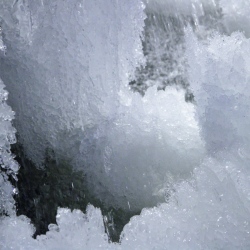
A major breakthrough in the field of molecular data storage proving that high volumes of data can effectively be stored in individual molecules. This research could lead to new, high-density data storage systems that potentially can hold more than 25 terabytes of data per square inch.
That’s around 25,000 gigabytes on something as small as a quarter.
Magnetism is the underlying force that most modern hard disk drives use to store data. Magnetic grains, typically 10 to 20 nanometers in size, are used to encode a single bit of data. These tiny magnetic grains are flipped to either north or south to represent a 1 or a 0. The memory effect, where a material retains its alignment after a greater magnetic field is removed, is called magnetic hysteresis.
The big challenge scientists have faced in developing even smaller data storage systems is that single molecules tended to not achieve magnetic hysteresis unless kept at incredibly cold temperatures. The previous temperature record for achieving magnetic hysteresis on a molecular level was -259 °C. The economics in creating a functional molecular data storage system at that temperature were never particularly practical, as it would require an expensive liquid helium cooling system.
In new research from the University of Manchester the team has reportedly achieved magnetic hysteresis in individual molecules based around an atom of the element dysprosium at -213 °C. This smashes the previous temperature benchmark and comes close to establishing the potential for a realistically affordable molecular data storage system.
"Here we are approaching the temperature of liquid nitrogen, which would mean data storage in single molecules becomes much more viable from an economic point of view," says co-lead on the study Dr Nicholas Chilton.
The goal is to cross the -196 °C threshold which would then allow molecular data storage systems to be cooled by the much more affordable liquid nitrogen.
Molecular data storage could potentially revolutionize the way major data centers around the store information. As well as offering up to 100 times higher data density that current technologies, the system is theoretically much more energy efficient than traditional storage systems.
Of course this kind of extreme cold temperature control means that the average consumer won’t be grabbing a molecular hard drive from their local office supply store anytime soon, but the potential for this research to dramatically effect big data storage is immense.
Google for example, has reportedly invested US$30 billion in building new giant data centers in just the past three years, and with more and more of our information moving into the cloud we will be increasingly relying on large-scale data storage in future.
The Manchester team is confident it will crack the liquid nitrogen benchmark sometime in the future and potentially develop molecular storage systems that can operate at even higher temperatures.
